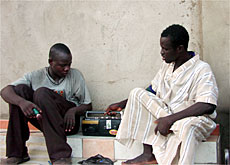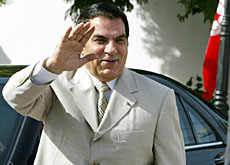Slow Info Summit progress frustrates Swiss

Switzerland says too much talk and not enough action are hindering preparations for an upcoming Information Summit in Tunisia.
The head of the Swiss delegation, Marc Furrer, told swissinfo that the process was being bogged down by unnecessary debate over issues already resolved.
Over the past ten days, around 1,700 international experts have been meeting in Geneva to prepare for the second phase of the World Summit on the Information Society (WSIS), which will take place in Tunis in November.
The first part of the WSIS, held in Geneva in 2003, resulted in an ambitious action plan to bridge the digital divide between rich and poor nations.
Since then, Furrer says delegates have made slow progress towards achieving the summit’s goals.
swissinfo: How satisfied is Switzerland with this latest round of preparatory talks in Geneva?
Marc Furrer: We are not very happy. We saw points in the action plan and declaration, which were already agreed upon back in 2003, re-opened for debate. We shouldn’t be discussing what has already been decided.
We also need to be demonstrating our successes in areas such as e-health, e-education and freedom of the media.
The citizens of Switzerland and other countries will begin to ask what we achieved. We need to be moving towards implementation of our plans because it’s a waste of taxpayers’ money to sit around and talk without taking action.
swissinfo: Has any progress been made at all, especially on the issue of financing the development of information and communication technology infrastructures in poor countries?
M.F.: Delegates welcomed the creation of a “digital solidarity fund” and that’s a concrete example of progress. We agreed that it would be a voluntary fund and just one of many financial mechanisms aimed at bridging the digital divide. In 2003, this was one of the biggest obstacles we faced, so reaching an agreement represents a big step forward.
The downside of the financial discussions is that the wording remains too technical and dissenting opinions remain… so delegates need to change their attitude and stop being so technocratic.
swissinfo: The World Bank says the technology gap between developing and industrialised countries is rapidly closing. Are the summit and the UN’s costly campaign to bridge the digital divide still relevant?
M.F.: The World Bank is absolutely right that countries like India, Morocco, Egypt, Argentina and Venezuela are catching up fast when it comes to telecom access. It’s likely that they’ll even leapfrog and surpass Switzerland someday.
So yes, the digital divide is narrowing fast. But when we talk about digital solidarity, we’re talking about the world’s 50 poorest countries, where there is still a major lack of electricity and access to phones.
How many telephones are there in Madagascar, Nepal or Bhutan compared with Switzerland, France or Germany? There is truth in what the World Bank says, but the digital divide is very real in many places.
swissinfo: Another lingering issue is internet governance. Was any progress made on deciding who should be responsible for policing the World Wide Web?
M.F.: I think we’re on the right track… we just can’t expect a revolution. The important thing is that the internet works and is independent from governments. But if it isn’t broken, we shouldn’t be trying to fix it.
swissinfo: At the start of the conference last week, civil society groups criticised Tunisia’s human rights record and said it was no place for a summit dealing with freedom of expression.
M.F.: I have always expected the Tunisian government to play by the UN’s rules and allow all journalists and civil society groups to participate in the summit process.
If I listen to the Tunisians, they say they’re open to this. But the proof will be in the pudding and we’ll only know the answer in November. If this isn’t an open and fair process, Tunis will be a disaster.
swissinfo-interview: Anna Nelson in Geneva
The United Nations decided to hold the World Summit on the Information Society in two phases: the first took place in Geneva in 2003 and the second will be held in Tunisia in November.
The aim of the summit is to bridge the digital divide between rich and poor nations, as well as tackle thorny issues such as internet governance.
The UN also hopes to fight poverty, hunger and disease by broadening access to technology, such as mobile phones, in developing countries.

In compliance with the JTI standards
More: SWI swissinfo.ch certified by the Journalism Trust Initiative











You can find an overview of ongoing debates with our journalists here . Please join us!
If you want to start a conversation about a topic raised in this article or want to report factual errors, email us at english@swissinfo.ch.